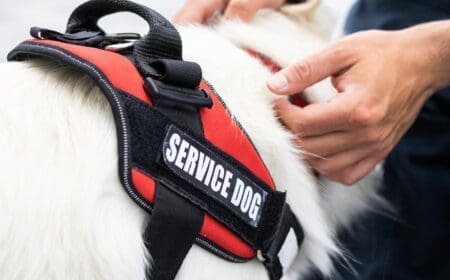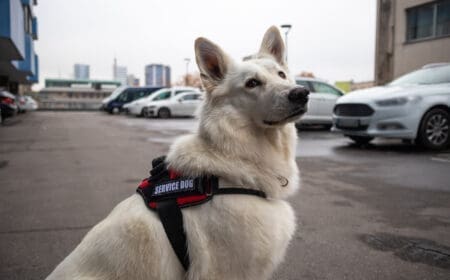South Carolina does not have its own specific laws regarding emotional support animals (ESAs). That said, it’s still crucial for you to be aware of which overarching laws and regulations apply to your ESA in the state.
In this article, we’re going to look at housing, workplace, travel, and public access laws for ESAs in South Carolina. We’ll also explain how you can get an ESA letter, which is the legal document every ESA owner must have.
Housing Laws for ESAs in South Carolina
In South Carolina, the housing rights for emotional support animals are primarily dictated by the Fair Housing Act (FHA), a federal law designed to prevent discrimination in housing based on several protected characteristics, including disability.
This means that landlords operating in South Carolina aren’t allowed to deny housing to individuals solely based on their need for an ESA, even if the property has a “no pet” policy. While South Carolina doesn’t have any state-specific laws governing ESAs, the FHA still serves as the overarching framework for their housing rights.
So, what exactly does this mean for individuals with disabilities who rely on the emotional support provided by an animal? Firstly, it’s crucial to understand that eligibility for ESA housing protection rests upon two important factors: your disability and the animal itself.
You must have a psychiatric disability documented by a licensed mental health professional. This documentation typically takes the form of a letter outlining your disability and how the ESA directly alleviates your symptoms. These letters need to be renewed annually and must have the doctor’s details and signature on them.
With proper documentation in hand, the FHA lets you navigate the housing market without the fear of discrimination due to your ESA. Landlords are strictly prohibited from imposing additional fees like pet deposits or cleaning fees.
Think of it this way: an ESA isn’t considered a “pet” under the law, but rather a crucial medical tool to help manage a person’s disability. However, it’s important to note that landlords have the right to request verification of your disability and ESA status. This, of course, has to happen within the realm of reasonability and without any violation of your privacy, but you will need to provide the requested documentation regarding your ESA.
The Limitations of ESAs in South Carolina
While ESA rights grant significant leeway, they also come with their limitations. For instance, a landlord can deny an ESA if their presence poses a direct threat to the health or safety of others. This could include instances of aggressive behavior or potential harm to other residents.
Plus, while landlords cannot charge extra for your ESA, they can ask you to pay for any damages caused to the property by them. Remember, responsible ownership remains your responsibility – which means ensuring your ESA complies with local community standards regarding leash laws, vaccinations, and any other pertinent regulations.
If you’re still a bit confused, you can also visit government-based resources to fully figure your circumstances out. The US Department of Housing and Urban Development (HUD) is a valuable starting point, with information on the FHA and your rights as a tenant with an ESA.
Workplace Laws for ESAs in South Carolina
While you do possess the right to request “reasonable accommodations” for your ESA, including bringing them to work, things are not as straightforward as they might seem. With legal labyrinths being as complex as ever, let’s look at what exactly you can and can’t do with your ESA in the workplace.
You Can Request to Bring Your ESA to Work
You have the right to request your ESA be allowed at work. However, unlike service animals, there is no legal mandate for employers to approve your ESA request. Your employer has the discretion to deny it, provided they can demonstrate a legitimate business reason and do not discriminate against your disability itself.
To bolster your request, you’ll need to provide solid documentation. This includes a letter from a licensed mental health professional outlining your disability, how your ESA alleviates it, and their suitability for a workplace setting.
Be prepared to discuss how your ESA’s presence would benefit your job performance and address any concerns about disruptions or safety hazards.
Your Employer Is Not Legally Obligated to Grant Your ESA Request
It’s crucial to understand that despite your request, your employer might have legitimate reasons to deny your ESA’s presence. These could include allergies or safety concerns for colleagues, potential hygiene issues, or disruptions to the overall work environment. Their decision must not be based solely on discrimination against your disability, however.
Travel Laws for ESAs in South Carolina
Traveling with ESAs has undergone a significant shift in recent years, within and beyond the confines of South Carolina. In 2020, the Air Carrier Access Act (ACAA) was changed and no longer mandates airlines to accommodate ESAs free of charge aboard flights.
No More Free Airline Travel for ESAs in South Carolina
Gone are the days of automatic, cost-free ESA air travel. The ACAA now stipulates that airlines can set their own rules regarding transporting these animals. This means that while some airlines may still choose to allow ESAs in the cabin for a fee, others may have stricter policies and might not allow ESAs at all.
It’s crucial to research and contact your chosen airline well in advance to understand their specific ESA policies, including any associated fees and restrictions.
Services Animals Can Fly for Free in South Carolina
The ACAA continues to require all airlines to accommodate legitimate service dogs free of charge. If your ESA qualifies as a service dog, defined as one trained to perform specific tasks to assist with a disability, then you can travel with them confidently, knowing your rights are protected under federal law.
The state of South Carolina also aligns itself with the amended ACAA, meaning airlines operating within its territory are not obligated to offer free ESA transportation. Yet, individual airlines still have the freedom to establish their own policies, potentially allowing ESAs for a fee.
Public Access Laws for ESAs in South Carolina
Public access is another category where emotional support animals fall into a gray area – some places may be happy to allow them, while others may not. The main difference typically comes from the distinction between service dogs and ESAs, with the former having many more privileges due to the nature and importance of their help.
The Difference Between ESAs and Service Animals
Service dogs, rigorously trained to perform specific tasks for individuals with disabilities, enjoy guaranteed access to most public spaces covered by the ADA. This includes restaurants, stores, government buildings, and even airplanes.
However, ESAs, whose primary function is to provide emotional support, are not covered under the ADA and, therefore, do not have a legal right to public access.
You Can Ask Businesses to Allow Your ESA – But It’s Not Legally Guaranteed
While businesses and public places in South Carolina are not obligated to allow ESAs, many establishments choose to make accommodations on a case-by-case basis. It’s always best to contact the establishment in advance to inquire about their specific ESA policies. Be prepared to the benefits your ESA provides, and offer assurances of responsible ownership, including proper leashing and waste disposal.
An establishment may deny your ESA entry, but they cannot discriminate against you based on your disability. You may find alternative public spaces that welcome ESAs, or opt for delivery or curbside pickup services instead.
Throughout this process, it’s also crucial to be mindful of potential concerns businesses might have. These could include allergies, public hygiene, potential disruptions, or even the specific ESA. Always ensure your ESA is well-behaved and adheres to local public health regulations. Often, businesses and individuals will recognize the value of an ESA, and through open communication from your end, they’ll be more receptive towards allowing them in.
Why Are ESAs Treated Differently From Service Animals in South Carolina?
Service animals and ESAs are not treated the same since not only do they perform different roles, but they also go through vastly different intensities of training. Here’s a breakdown of the main differences in a number of categories:
Purpose and Training
Service animals: They undergo rigorous training to perform specific tasks directly assisting people with disabilities, such as guiding a blind person or retrieving dropped objects. This training allows them to navigate public spaces effectively and minimize disruptions.
ESAs: Primarily provide emotional comfort and support, which is subjective and difficult to quantify. While beneficial, there’s no training required for it.
Legal Framework
Service animals: Protected under the Americans with Disabilities Act (ADA), granting them guaranteed access to most public spaces where the public is allowed. This legislation recognizes their essential role in mitigating disability limitations.
ESAs: Governed by the Fair Housing Act (FHA), which protects them from housing discrimination but doesn’t extend to public access rights. The FHA recognizes their value in supporting mental health, but their function doesn’t fall under the ADA’s definition of assisting with disabilities.
Verification and Accountability
Service animals: There is no documentation or identification required for service animals. In fact, they don’t even have to wear service animal vests. To verify your service animal’s status, people can only ask you what your disability is and how the animal helps you with it.
ESAs: Verification relies on letters from licensed mental health professionals, with varying levels of detail and standardization. This makes it harder to guarantee consistent training and behavior across all ESAs.
How You Can Make Your Dog an ESA in South Carolina
The process of making your dog an ESA will be slightly different depending on a number of different factors, but here’s a general guide that you can follow to get a letter:
Eligibility
You must have a verifiable disability recognized by the Americans with Disabilities Act (ADA). This requires a diagnosis from a licensed mental health professional, such as a psychiatrist, psychologist, or therapist.
If you suffer from mental health conditions like depression, anxiety, post-traumatic stress disorder (PTSD), or bipolar disorder, and your pet helps you cope with their symptoms, then there’s a good chance you’ll be able to get an ESA letter.
Documentation
You need a signed letter from your qualified mental health professional stating:
- That you have a mental disability.
- How your dog helps alleviate your symptoms and disability-related needs.
- Confirmation that your dog is well-behaved and poses no threat to others.
Tips for ESA Owners
Owning an ESA isn’t easy. You have to take care of them just like you would with a regular pet and that means giving them time and attention. You also have to make sure that you get your ESA letter from a licensed mental health professional in South Carolina. If your ESA letter isn’t legit or you obtained it through fraudulent means, you can get into legal trouble.
Here are some tips to remember if you are planning to get an ESA soon:
- Know the limitations: As we mentioned earlier, ESAs do not have the same public access rights as service animals. You can’t take them everywhere with you. If you intend to go to a restaurant with them, it’s best to call the place first and ask them if they’ll be okay with it.
- Responsible ownership is crucial: Your ESA must be well-behaved, properly vaccinated, and leash-trained in public spaces. There’s no legal requirement to train ESAs, but if you don’t want other tenants in your building to complain to your landlord, then you should teach them some basic obedience skills.
Once again, remember to consult a licensed mental health professional to discuss your disability and suitability for an ESA. If you’re looking for more information or help, you can also explore reliable resources like the National Center for PTSD or mental health professional associations for guidance.
Life With an ESA in South Carolina
The legal jargon and complexities you have to navigate regarding your ESA in the state of South Carolina can definitely feel overwhelming at first – but when you break them down into categories, it gets a lot easier.
In each of these categories, remember that the law is there only to uphold reasonable accommodations and requests. Familiarize yourself with these laws so you and your ESA can ensure that your rights are respected in South Carolina.
FAQs About ESAs in South Carolina
We’ve gathered answers for some of the most common questions about ESAs in South Carolina below,
Can My Pet Become an ESA in South Carolina?
As long as you are diagnosed with a mental or emotional disability, and your licensed mental healthcare worker prescribe
Can I Take My ESA Everywhere With Me in South Carolina?
No, you can’t take your ESA with you everywhere. While ESAs provide valuable support, they don’t have the same public access rights as service animals. Businesses can choose to allow them, but it’s not guaranteed. Research specific policies before bringing your ESA anywhere.
Is It Difficult to Get an ESA Letter in South Carolina?
It’s usually very easy to get an ESA letter. If you have a qualifying disability and your mental health practitioner supports your need for one, it can be a straightforward process.




